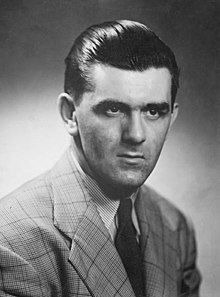History of the National Hockey League/1942–1967/Maurice Richard
The 1940s Canadiens were led by the Punch line of Elmer Lach, Toe Blake and Maurice "Rocket" Richard. In 1944–45, Lach, Richard and Blake finished first, second and third in the NHL's scoring race with 80, 73 and 67 points respectively. It was Richard who became the focus of the media and fans as he attempted to score 50 goals in a 50 game season, a feat no other player had previously accomplished in league history. During that season, Richard set a single-game scoring record, scoring five goals and three assists, in a 9–1 victory over Detroit on December 28, 1944. By later scoring his 45th goal in his 42nd game, he broke Joe Malone's goal scoring record. Opposing teams did all they could to prevent him from reaching the 50-goal mark: he was slashed, elbowed and held as no team wanted to be known as the one that gave up the goal. Richard finally scored his 50th goal in Boston at 17:45 of the third period of Montreal's final game of the season. No other player scored 50 goals in 50 games until Mike Bossy in 1980–81.

In March 1955, Richard was suspended for the remainder of the season, including the playoffs, after he received a match penalty for slashing Boston's Hal Laycoe then punching a linesman who attempted to intervene. The suspension touched off a wave of anger towards Campbell, who was warned not to attend a scheduled game in Montreal after receiving numerous death threats, mainly from French-Canadians accusing him of anti-French bias Campbell dismissed the warnings, and attended the March 17 game as planned. His presence at the game was perceived by many fans as a provocation and he was booed and pelted with eggs and fruit; an hour into the game, a fan lobbed a tear-gas bomb in Campbell's direction, and firefighters decided to clear the building. Fans leaving the Forum were met by a growing mob of angry demonstrators outside, who overwhelmed the 250 police officers on the scene, and rioted outside of the Forum. Seventy people were arrested, 37 people injured, fifty stores were looted and $100,000 in property damage was reported in the melee, which became known as l'affaire Richard, or the Richard Riot.
The following day, Richard went on the Montreal radio and asked the fans to stop rioting and instead to support the Canadiens in the playoffs; he also said he would take his punishment and come back the following year to win the Cup. While the Canadiens were eliminated in the 1955 Stanley Cup Finals, Richard led Montreal to the 1956 Stanley Cup. The incident highlighted the growing cultural gap between French Quebec and English Canada and the riot is often described as an early manifestation of Quebec's Quiet Revolution. Campbell's decision to suspend Richard was widely supported by fans outside of Quebec. Some, including Detroit's Ted Lindsay, said the suspension did not go far enough and argued that Richard, a man who had paid more fines than any other player in league history, should have been banned for life.
Richard became the first player to score 500 career goals on October 19, 1957. He retired in 1960 as an eight-time Stanley Cup champion, as well as the NHL's all-time leading scorer with 544 goals. In 1961, the league waived the customary three-year waiting period and Richard was elected to the Hockey Hall of Fame.